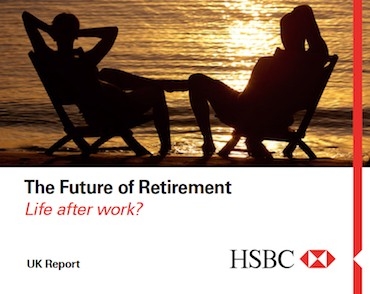One in five workers (19 per cent) in the UK expect that they will never be able to afford to retire fully, according to HSBC's The Future of Retirement report.
The report authors say that the findings paint a bleak picture for those in the UK that are living alone in retirement. Britons topped the league table of the countries with the highest proportion (36 per cent) of those who are divorced or separated and expecting to work indefinitely - compared to just 20 per cent globally.
Some 31 per cent of those who are widowed had the same expectation - compared to 23 per cent globally.
The global survey, which covers over 16,000 people in 15 countries, underlines the extent to which the retirement landscape is changing as economic pressures and longer life expectancy take their toll, says HSBC.
HSBC's report, The Future of Retirement Life after work? surveyed 1,050 respondents in the UK. Two fifths of retired people surveyed (39 per cent) in the UK said that financially, they had not prepared adequately or at all for a comfortable retirement, with 35 per cent of those people only realising they were underprepared after retiring.
Despite this, just 2 per cent of Britons who did not prepare adequately or at all said they would have to go back to work to cover their financial shortfall, compared to 44 per cent globally. Instead, a huge 44 per cent are resigned to the idea that they will just never be able to make up their shortfall.
Global findings showed that while many will be forced to work longer than they had planned, a significant proportion of people around the world looked forward to working in later life. However, while 27 per cent globally said they intended to start a business in retirement, a remarkably smaller 7 per cent of those questioned in UK felt the same, with Britons seemingly lacking the same entrepreneurial spirit.
However, this attitude changed with age, as 37 per cent of UK respondents between 55-64 years of age said it was actually an aspiration to continue working (compared to 44 per cent globally).
Christine Foyster, head of wealth management, HSBC, said: "People want to slow down in later life and, while some welcome the chance to stay economically active, many may not. Whereas some people regard a comfortable retirement as a natural entitlement, for a growing number this is not the case.
{desktop}{/desktop}{mobile}{/mobile}
"Today's workers should prepare for retirement as early as possible to have some certainty for retirement. Life is full of reasons to prioritise short term spending over longer term planning, but the sooner people start saving, the less likely they will have to rely on working in old age."
HSBC's study suggests that even those who do eventually retire might not be able to achieve the retirement they want. Half (49 per cent) of retired people surveyed in the UK who said they have been unable to realise their plans for retirement, believed this was because they have less money to live on than they had envisaged.
It found that people's expectations of a work-free retirement dwindle as they enter old age, with 20 per cent of people between 55-64 years of age saying they expect they will have to continue working indefinitely, compared to just 15 per cent of 25-34 year-olds.
An online survey tool is available to allow individuals to see how they compare against the country findings, at www.hsbc.com/retirement.

